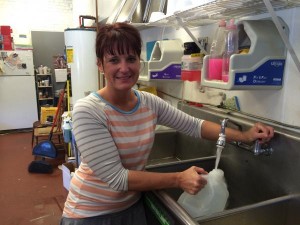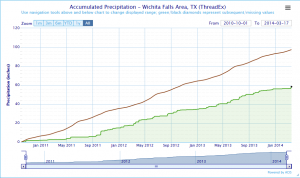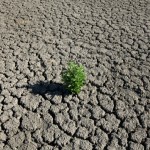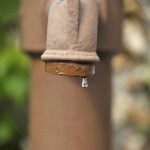Wichita Falls Sees Wastewater Recycling As Solution To Drinking Water Shortage

Shelley Kofler KERA News
Julie Spence of Wichita Falls says she trusts the city to adequately treat wastewater for drinking.
From KERA News:
Wichita Falls could soon become the first in the country where half of the drinking water comes directly from wastewater.
Yes, that includes water from toilets. For some citizens, that’s a little tough to swallow.
Mayor Glenn Barham says three years of extreme drought have changed life for 104,000 people living in Wichita Falls, which is about 140 miles northwest of Dallas.
“(There’s) no outside irrigation whatsoever with potable water. Car washes are closed one day a week. If you drain your pool to do maintenance you aren’t allowed to fill it,” he explained.
That’s right: What residents flush down the toilet will be part of what’s cleaned up and sent back to them through the tap.
“I think it’s gross,” said Marissa Oliveras as she ordered a glass of tap water with her sandwich at Gidget’s Sandwich Shack in downtown Wichita Falls.
“I mean it’s recycled wastewater we could be drinking,” she said. She plans to switch to bottled water.

Victor Murphy / National Oceanic and Atmospheric Administration
Precipitation records for the last three years in Wichita Falls, Texas, one of the areas hit hardest by the drought. The brown line is the expected precipitation level, and the green area is actual levels.
Kira Smith saves money ordering tap water at the restaurant now, but says she’ll pay $1.89 for a bottle of water when the recycled wastewater begins to flow.
“It definitely grosses me out,” Smith said. “I’m sure that they would clean it and filter it up to standards. But it’s a mindset kind of thing. You know what I’m talking about?”
Barham says the city has undertaken a massive education campaign to reassure residents that the water will be clean and safe to drink, and to explain the science behind the treatment process.
Water experts know it as “direct potable reuse,” something that’s been tried on a much smaller scale in Big Spring, Texas.
But some people unceremoniously call it “toilet-to tap,” a moniker that Utilities Operations Manager Daniel Nix says isn’t really accurate.
“The vast majority of water that enters a wastewater plant did not come from a toilet. It comes from sinks, and bathtubs and washing machines and dishwashers,” he said. Nix said less than 20 percent of wastewater comes from toilets.
Currently, wastewater here is treated and then emptied into the nearby Big Wichita River, where a natural cleansing process takes place. The water flows downstream to Lake Texoma, a big reservoir, where other cities treat it again before drinking it.
Nix says his city will recreate that natural cleansing process at its treatment plant.
Nix shows off several buildings full of equipment that will soon take the city’s dwindling supply of water from Lakes Arrowhead and Kickapoo and blend it with the treated wastewater. It will be a 50-50 mix that gets extra chlorination, advanced filtering and reverse osmosis.
Nix says the extra treatment will eliminate unwanted minerals and pathogens like cryptosporidium and giardia.
“We just don’t have time to put the water out in a body of water, a wetlands, or lake and allow nature to take its course,” Nix said. “Inside the treatment plant, we speed those processes up so rather than wait several weeks for UV rays from the sun to disinfect or kill bacteria we do it in the plant using chlorine. It takes a matter of minutes to do it instead of weeks.”
At Gidget’s Snack Shack, Stephen Johnson is fine with what the city is about to do.
“If it’s a safe process and it’s potable, I don’t see an issue with it. It’s water,” Johnson said with a shrug.
The restaurant’s owner, Julie Spence, says the city has done a lot of research and testing so she trusts officials to get it right.
She says she has to.
“It’s either that or pack up and move,” Spence said. “This is where I was born and raised and I’m not ready to close my business and pack up and move.”
Barham says he’s reserved the right to take the first sip when the recycled wastewater begins to flow.
He’s optimistic that most of his neighbors in Wichita Falls will also raise a glass and drink.

